What is Monkey B virus and how dangerous is it?
People typically get infected if they are bitten by an infected macaque monkey, says the CDC

Your support helps us to tell the story
From reproductive rights to climate change to Big Tech, The Independent is on the ground when the story is developing. Whether it's investigating the financials of Elon Musk's pro-Trump PAC or producing our latest documentary, 'The A Word', which shines a light on the American women fighting for reproductive rights, we know how important it is to parse out the facts from the messaging.
At such a critical moment in US history, we need reporters on the ground. Your donation allows us to keep sending journalists to speak to both sides of the story.
The Independent is trusted by Americans across the entire political spectrum. And unlike many other quality news outlets, we choose not to lock Americans out of our reporting and analysis with paywalls. We believe quality journalism should be available to everyone, paid for by those who can afford it.
Your support makes all the difference.A 53-year-old man in China has died after contracting the Monkey B virus (BV), a rare infectious disease that comes from primates, according to a study by the country’s Centre for Disease Control and Prevention (CCDC).
The CCDC, in its study uploaded on its website on 3 July, identified the man as a veterinary surgeon who worked at an institute specialising in nonhuman primate breeding and experimental research in Beijing, adding that this was the “first human infection case with BV identified in China.”
The veterinary surgeon dissected two dead monkeys on 4 and 6 March this year and experienced “nausea and vomiting followed by fever with neurological symptoms one month later.”
He visited several hospitals and eventually died on 27 May, according to the CCDC study.
BV, initially isolated in 1932, is known by several names, including herpes B virus, monkey B virus, herpesvirus simiae and herpes virus B. It is also “currently referred” to as Macacine alphaherpesvirus 1 by the International Committee on Taxonomy of Viruses, according to the CCDC study.
The US Centres for Disease Control and Prevention (CDC) pointed out that BV is extremely rare, “but it can lead to severe brain damage or death if you do not get treatment immediately.” The CDC said “people typically get infected with B virus if they are bitten or scratched by an infected macaque monkey, or have contact with the monkey’s eyes, nose, or mouth.”
One previous case of human-to-human transmission of BV has been documented, even though the risk for secondary transmission appeared to be minimal, according to the CCDC study.
“Zoonotic BV infections have mainly involved primate veterinarians, animal care personnel, or laboratory researchers in North America,” the study said.
There have, however, been no fatal or clinically evident BV infections in China before 2021, according to the CCDC: “Here, we reported the first human infection case with BV identified in China.”
“BV is an alphaherpesvirus enzootic in macaques of the genus Macaca,” it said, pointing out that the virus is normally transmitted horizontally via direct contact and exchange of bodily secretions, just like the herpes simplex virus (HSV) in humans.
The CCDC has stressed on the urgency to strengthen surveillance in laboratory macaques and occupational workers in China and the necessity to eliminate BV while developing specific pathogen-free rheses colonies.
“Other primates, such as chimpanzees and capuchin monkeys, can become infected with B virus and will frequently die from these infections,” the agency said. However, there have not been documented cases of these primates spreading BV except to macaques.
The CDC said infections in people are rare. Since the B virus was identified in 1932, “only 50 people have been documented to have infections” and out of this, “21 of them died”, it said.
“Most of these people got infected after they were bitten or scratched by a monkey, or when tissue or fluids from a monkey got on their broken skin, such as by needle stick or cut,” the CDC added.
In 1997, researcher Elizabeth Griffin died from one such infection, after a drop of liquid was flung by an infected monkey into the researcher’s eye.
Hundreds of bites and scratches occur every year in monkey facilities in the United States, but people rarely get infected with B virus, according to the CDC.
“If you are in a place where there are macaque monkeys, you should stay away from them so that you do not get bitten or scratched. You should not touch or feed monkeys,” the CDC said on its website.
The symptoms of the Monkey B virus typically start within one month of being exposed to it, but can appear in as little as three to seven days.
The first indications of BV infection are typically flu-like symptoms: fever and chills, muscle ache, fatigue and headache. Once infected, one may develop small blisters in the wound or area on your body that had contact with the monkey, the CDC pointed out.
Other symptoms may include shortness of breath, nausea and vomiting, abdominal pain and hiccups. As the disease progresses, the virus spreads to and causes inflammation of the brain and spinal cord. This can lead to brain damage and death.
Currently, there are no vaccines against the Monkey B virus.
Meanwhile, two close contacts of the Beijing vet who died of the Monkey B virus in China have tested negative for the virus, officials said.
Join our commenting forum
Join thought-provoking conversations, follow other Independent readers and see their replies
Comments